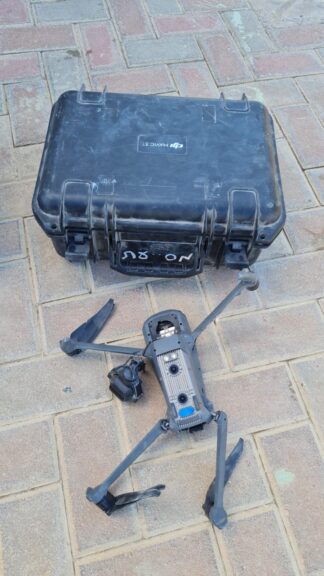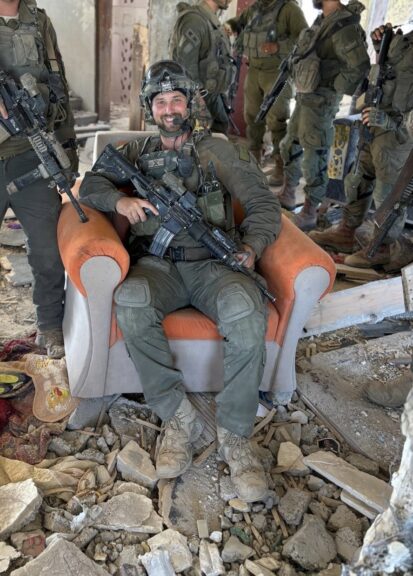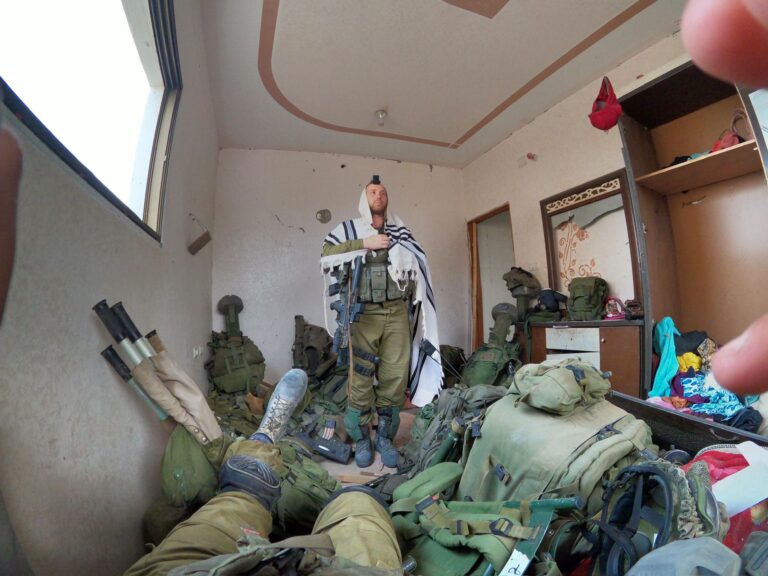 (Photo by Ashraf Amra/Anadolu Agency/Getty Images and Courtesy of Chaim Meisels)
(Photo by Ashraf Amra/Anadolu Agency/Getty Images and Courtesy of Chaim Meisels)
American Israeli Defense Forces reservist Chaim Meisels didn’t just fly from New York to Israel on October 7, 2023, to fight against Hamas — he also helped the IDF acquire the drone that located Hamas leader Yahya Sinwar.
Sinwar, 61, was killed in October after the drone detected a group of militants moving between buildings. The drone helped pinpoint the terrorists’ location, leading to a firefight and the terrorists splitting up before being killed. Sinwar ran alone into a building and was eventually killed.
Sinwar’s final moments were captured by another drone, which recorded him sitting with his head covered and throwing what appears to be a stick at the device. The IDF was not immediately aware that Sinwar was part of the group of militants.
The first drone, donated by a group in New Jersey, was a DJI Mavic equipped with thermal imaging and primarily used for general observation. The second drone, a DJI Avata, was donated by London fashion designer Hannah Lancry Sufrin, and is designed for navigating small spaces, such as entering buildings through windows, according to Meisels. Lancry told The Daily Wire she has raised close to half a million dollars since the war began to assist with getting supplies to the IDF.
#BREAKING Drone footage shows the last seconds of Sinwar’s life pic.twitter.com/XwmEZRzWfo
— Aviva Klompas (@AvivaKlompas) October 17, 2024
Meisels, 30, told The Daily Wire that after being honored as a guest of a synagogue in Teaneck New Jersey, a family hosting him asked how they could support the 828th Bislamach Brigade he belongs to. Meisels explained that his unit would benefit from more equipment, including drones.
“When I got to my unit after October 7, it’s sad to say but we had almost nothing,” Meisels said. “After October 7, there were close to 300,000 reserve guys that joined in and had to become part of the fight and the IDF did not have helmets or vests for them. Jews in America pitched in and donated so we could do our job.”
Lindsay, who requested her last name be withheld for fear of her safety, told The Daily Wire she organized the fundraising, which amounted to about $10,000, given by members of her shul, the rabbi’s discretionary fund, and a few donors from another state.
“The excitement we all felt when we heard Sinwar was dead and that the drone we donated helped locate him was unreal,” Lindsay of Teaneck, New Jersey, who helped organize the fundraising for the drones told The Daily Wire. “It was great news to receive.”

DJI Mavic drone donated to the IDF by a group of Jews in New Jersey. (Photo: Courtesy of Chaim Meisels)
Lindsay and her family purchased the drones in May and provided them to Meisels. According to Meisels, the drones were fully operational in Gaza by June.
“October 7th wasn’t an attack just on Israel. It was an attack on Jews all over,” Meisels explained. “So they wanted to help and one of the ways they were able to help is by donating equipment to the guys on the front lines in Israel. So a lot of drones were donated, a lot of helmets, a lot of vests, a lot of tourniquets or basic stuff for the guys in order to be able to fight better.”
CHECK OUT THE DAILY WIRE HOLIDAY GIFT GUIDE
Meisels explained that while the IDF has many drones, they are often shot down and need to be replaced, which is costly. He said that when one is donated, its software is modified to function in combat and connect to IDF systems.
Though Meisels is proud of his unit, which used the drones to help eliminate Sinwar, he was not present during the operation because he decided to take a few hours off to see his wife and newborn daughter on what appeared to be a low-action day.
“Because my wife came to Israel I went to visit her,” Meisels explained. “When I came back I realized that they had killed Sinwar and they were doing a lot of good stuff. I was kind of sad to not be part of it, but we put in a tremendous amount of work the days later to find hostages.”

Chaim Meisels sitting on the chair Sinwar was seen sitting on before he died. (Photo: Courtesy of Chaim Meisels)
Meisels, a native of Williamsburg, Brooklyn, was raised in the Orthodox Jewish Satmar community — one of the largest Hasidic groups. He is the great-grandson of the famed Rabbi Moshe Teitelbaum, the former leader of Satmar, who passed away in 2006.
Meisels says he is the only grandchild (of about 500) fighting in the IDF, as the group does not support its members fighting in Israel’s military. But Meisels said he felt a connection to Israel at a young age and agreed to a short commitment that turned into nearly six years of service, during which time he rose to the rank of captain.
“It ended up that I was there for close to six years after becoming a commander and then going to the Israeli West Point, which made me an officer and later a captain,” he said. “After my service, I moved back to the United States to continue my life over here.”
Meisels served about six years in Israel as a “lone soldier,” a term used for Jews from the diaspora fighting in the IDF without any immediate family present in the country. He said most of the time he was training for a potential war, but on October 7, just four months after his wedding, he flew to Israel to fight.
“I went to JFK to be on the first flight to Israel, and I was there on Sunday,” he said. “Only when I landed in Israel, I realized what actually happened. I knew it was very bad but I didn’t know how bad it was.”
Meisels first went to the Lebanon border with his unit in case Hezbollah decided to replicate Hamas’s attack. Then he was one of the first units to enter Gaza to help bring back the hostages.
Fighting in Gaza has been difficult because of the urban warfare environment, said Meisels.
“It just changed my whole perspective on fighting in a neighborhood where the civilians might be terrorists,” he said. “We got shot at by people who looked like regular people. So we didn’t want to open fire on them in the beginning. But then they see you start shooting at you in civilian clothing and it kind of made the world very tough for us to be able to differentiate when you’re going to shoot back and when not because we didn’t want to kill civilians.”
Meisels said it shocked him that he found weapons in every Gazan house he entered. He said he also found traces of hostages in civilian homes.
“You go into a house and everything is normal and then you find papers or an I.D. from one of the hostages so you knew those guys had to be involved with that, which was very shocking to me in the beginning,” he said. “There isn’t a lot of civilians and a lot of the people there identify with Hamas and will try to kill you if they can.”
Meisels supports balance when it comes to having more Orthodox men fighting in the IDF, a topic that has caused stark divisions in Israeli society. Many religious groups prefer to have men studying the Torah in religious programs, called yeshivas, while other religious groups and secular society believe fighting-age men should participate in Israel’s mandatory draft.

Chaim Meisels praying while serving in Gaza for the IDF. (Photo: Courtesy of Chaim Meisels)
“There are 7 to 9 million Jews living in Israel and we want to protect them,” he said. “You can’t force people to join the IDF though, so to get this group to join it has to be done in a smart way, including making following religious observance possible while serving.”
He added that though he believes more men should serve, not everyone is cut out.
“I think that most of the Haredi community should serve, but not everyone,” he said. “Some people are just not made for the army system. There’s a lot of people who should, but you can’t make it everyone, because then it’s going to become very hard for some guys that I don’t want to get a gun.”
He said that other roles for mandatory service, such as in the ambulance system, fire department, or police may be a suitable compromise.
“We, as Orthodox Jews believe that a lot of men that are able should be learning and become rabbis because we believe that that’s also helping to protect Israel and it’s good for the future we need,” he said. “Like we need professors and doctors in the secular world, we need people who learn and know Torah very well.”
While Meisels is not on reserve duty in the IDF, he serves as the National Chapters Director at the nonprofit Nevut, where he spearheads efforts to support returning lone soldiers as they transition back to the United States.
“There are a lot of guys who went to Israel to fight and then when they come back, some are struggling with PTSD,” he said. “We just basically try to tell them they’re not alone and we didn’t forget their service and we try to take care of them.”
Source link

